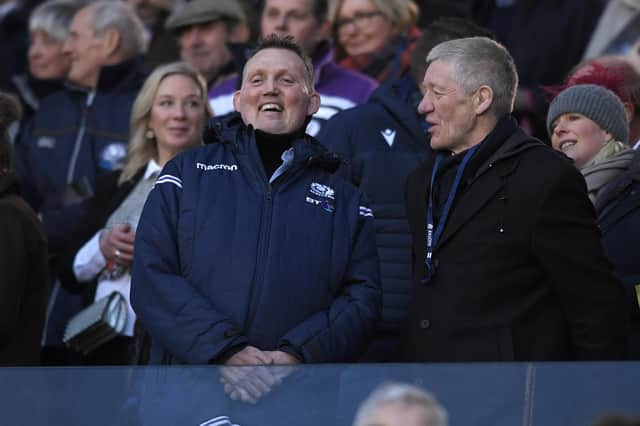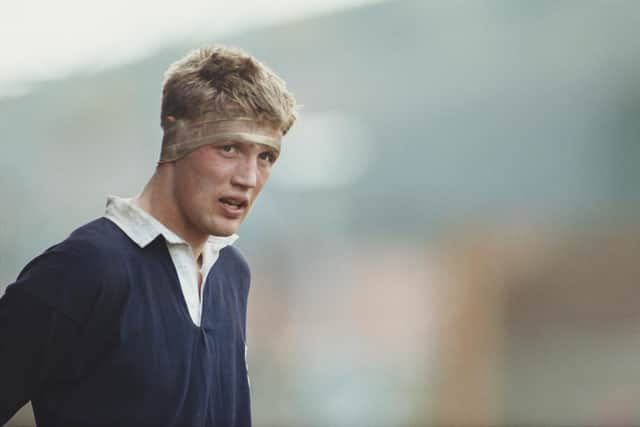Motor neurone disease: Doddie Weir and other rugby stars have helped focus ministers' minds on need to find a cure – Christine Jardine MP


I do not know them and, to be honest, have never been a follower of Ed’s career, but like so many others I am, unfortunately, aware of MND and the heart-breaking challenge that he and his family now face.
It is defined as a degenerative condition which affects nerves in the brain and spinal cord known as motor neurones. They are the ones which help to tell all the muscles in our bodies what to do. But that is only part of the story. A small part.
Advertisement
Hide AdAdvertisement
Hide AdThe statistics are frightening. One in 300 of us can be struck by motor neurone disease in our lifetimes.
But because it can claim lives rapidly, I do not believe that we are ever, as a society, fully aware of its impact, of the number of lives disrupted, the families torn apart, and the suffering in our own communities.
I am sure many of us have experienced the trauma of watching someone we know and love fighting the debilitating, progressive and ultimately always, fatal effects of the disease. In many cases, a life can be taken in less than a year.
I remember being told just before one Christmas that a friend had been recently diagnosed with MND. It was a complete shock. The sudden onset was followed by a cruel and rapid progression. That Christmas was his last.


But then we see cases like the remarkable Professor Stephen Hawking who lived with the progressive effects of MND for 55 years after his diagnosis.
And in Scotland, we have seen the astonishing campaign led by Doddie Weir. For my generation, seeing Doddie on a rugby field or hearing his name mentioned in commentary was always reassuring.
He earned 61 caps for Scotland, toured with the Lions in South Africa and won championships with both Melrose and Newcastle Falcons.
But it is his work off the field to improve our understanding of MND and increase public awareness of it that has raised that inspirational ability to a new level.
Advertisement
Hide AdAdvertisement
Hide AdHis foundation My Name’5 Doddie has achieved remarkable things in the five years since its establishment. Not least in launching the petition which secured a debate in parliament and playing a leading role in persuading the government to provide dedicated funding for research over the next five years.
The admiration which so many of us feel for Doddie, Rob Burrows, Gordon Aikman and so many more who have done so much to cast a spotlight on MND is hard to put into words.
In parliament, I have seen first-hand the impact their campaigns have had in mobilising public support to put pressure on the government to act more quickly. But it should not be left to those who are struck by MND to make things happen.
At Westminster, the All-Party Parliamentary Group on MND, of which I am a member, celebrates its 20th anniversary this year.
Our understanding of the disease has undoubtedly come a long way in that time, but the challenge of identifying a cause and finding a cure still remains tantalisingly out of reach.
During Covid, we saw so much of our medical research and treatment delayed or undermined but we must not let that setback become long-term. We must now ensure that the £50 million which the government has promised over five years for MND research is sharply focussed, and that the scientists so keen to tackle the issue are not hampered by prohibitive bureaucracy.
In doing so we can consolidate the UK’s position as a global leader in neurological disease research, particularly as we know that research into motor neurones could open the door to greater knowledge of and treatments for other conditions.
Alzheimer’s, other forms of dementia and various neurological conditions could all be better understood.
Advertisement
Hide AdAdvertisement
Hide AdAnd while relieving people of the pain and inevitability that a diagnosis of motor neurone brings we also should recognise the practical and financial benefits for society as a whole.
That is something we should ask our politicians to put to the forefront of their minds whenever spending on health or research is in question.
We have the example of how much has been done in the fight against cancer to follow. But we must never lose sight of the fact that we are not talking about a cold, inanimate scientific phenomenon. With all of these conditions we are talking about people, their lives, families and a future denied to each of them.
Watching news reports on Friday, I was struck by how, once again, it is rugby which is the sport at the centre of the motor neurone debate.
While there is no causal link with MND, there is increasingly a bond between the sport and those who are affected by it.
As a community, it has demonstrated tremendous support for its former players and commitment to raising awareness and tackling motor neurone disease for all of those whose lives it blights.
Our sporting heroes have always had the ability to inspire with their dedication, endurance and determination to succeed. But they are now using those very same qualities to inspire us anew in a very different challenge.
Our politicians must rise to that challenge and ensure that no opportunity to increase our understanding of MND, cancer, multiple sclerosis or so many other conditions is missed.
Advertisement
Hide AdAdvertisement
Hide AdWhere research is needed, our scientists must have both the political and financial backing it demands.
For those who have been dealt the cruellest of hands, it may be too late to change the inevitability of what they face.
But we can honour the work they are doing by ensuring that ultimately we succeed in creating a different outcome for those affected in the future.
Christine Jardine is the Scottish Liberal Democrat MP for Edinburgh West
Comments
Want to join the conversation? Please or to comment on this article.
